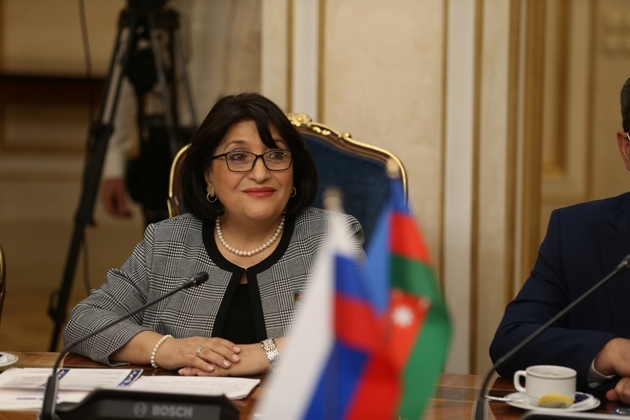There was a lot of firsts during new speaker of the Azerbaijani parliament Sahiba Gafarova's official visit to Russia this week. Sahiba Gafarova is the first woman chairman of the Azerbaijani Milli Mejlis. She is also the first foreign guest to visit the State Duma since the beginning of coronavirus pandemic, which was noted by Duma chairman Vyacheslav Volodin. And this is the first visit of Baku politicians to Moscow after the July aggravation of the Armenian-Azerbaijani conflict.
The media usually resonate with those meetings on which the fate of any conflict or dispute depends. For example, negotiations between the presidents of Russia, Turkey and Iran, Vladimir Putin, Recep Erdogan and Hassan Rouhani on Syria, or summits with the participation of U.S. President Donald Trump and Chinese President Xi Jinping, during which the fate of the "trade war" between the two economic giants is being decided.
However, ordinary working meetings are no less significant, especially when it comes to the post-Soviet space. Today we see that the "Arab Spring" waves have crept up to the CIS again. There is chaos in Ukraine, there is a constant internal political struggle in Moldova, Kyrgyzstan and Georgia. For two years, people have been in power in Armenia, whose foreign policy orientation remains a mystery even for an experienced analyst. And recently, Belarus, the closest state to Russia, has joined the arc of instability.
All these processes either undermine or potentially threaten Russian influence in the post-Soviet space, centuries-old political, cultural and economic ties are at risk of rupture. On the other hand, outside pressure is growing on Russia and the fraternal republics. The European Union has already declared President Alexander Lukashenko's power to be illegitimate, pushing Minsk towards the "Maidan". They have already been tightening the screws on Moscow. Using the poisoning of opposition blogger Alexei Navalny, Eastern European hawks almost persuaded German Chancellor Angela Merkel to abandon Nord Stream 2.
In these conditions, it is extremely important for Russia and Azerbaijan to preserve the allied relations tested by history. The visit of the Milli Mejlis parliamentary delegation was aimed precisely at achieving this goal, which Moscow understands. Thus, Volodin recalled once again that Azerbaijan is Russia's important strategic partner. The leaders of the countries have a regular dialogue, and the task of parliaments is to provide a legislative basis for their decisions. Chair of the Federation Council Committee on Science, Education and Culture Lilia Gumerova stressed that "we always feel the support of Azerbaijani parliamentarians when we need to promote our projects."
For her part, Gafarova stated that "centuries-old Azerbaijani-Russian ties, are based on traditionally friendly relations between the peoples of our countries." Contacts between the two states are expanding. "More than 200 interstate, intergovernmental and interdepartmental documents have been signed between our countries," she said.
The Russian language's role remains unshakable in Azerbaijan, which has branches of such well-known Russian universities as Lomonosov Moscow State University and I.M.Sechenov First Moscow State Medical University. Now Azerbaijan is actively cooperating with many Russian regions, including Dagestan, Tatarstan, Astrakhan and Saratov regions. During the visit, it was symbolic that Gafarova was laying a wreath at the Tomb of the Unknown Soldier, which is especially valuable at a time when the "progressive world" calls the heroism of Soviet soldiers into question.
The final chord of the Milli Mejlis delegation's visit were statements on the most significant issue for Baku - the settlement of the Nagorno-Karabakh conflict. Gafarova expressed hope that Russia, as the co-chairing country of the OSCE Minsk Group, "will use its authority and influence to put an end to this confrontation that has been dragging on for many years."Most Azerbaijani experts reasonably believe that the Kremlin holds the key to solving the Karabakh problem.
On the final day of the visit, official representative of the Russian Foreign Ministry Maria Zakharova said that a number of basic principles are taken into account in the negotiation process, including the transfer of the regions occupied by Armenia to Azerbaijan and the discussion of the status of Nagorno-Karabakh. Considering that the Russian Foreign Ministry's statements largely correspond to Baku's policy on resolving the conflict, it can be said that the results of the Milli Mejlis delegation's visit to Moscow turned out to be very fruitful.






